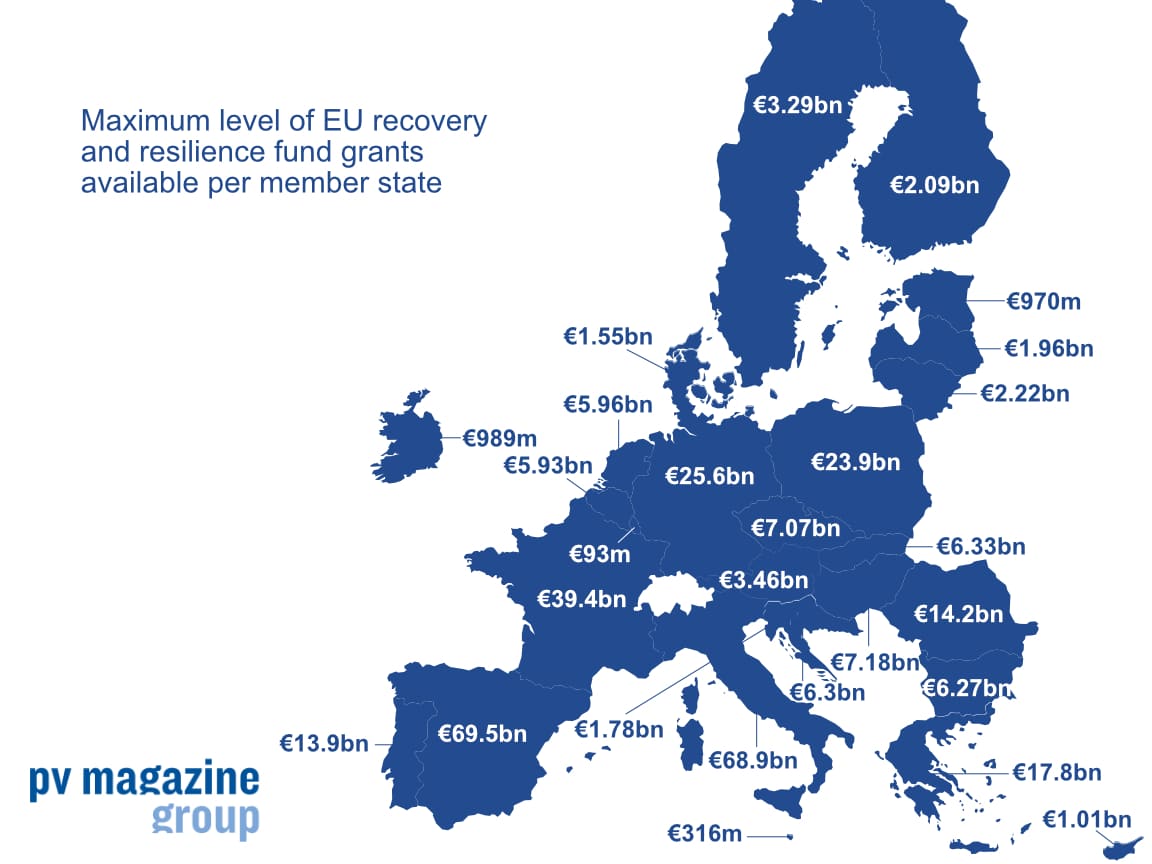The European Commission has revealed some €17.8 billion of the funding requested by EU member states to finance their recovery from Covid-19 will be devoted to renewable energy facilities, including solar.
The EU executive on Tuesday published a report into the first year's activity of the huge, up-to-€724 billion Recovery and Resilience Fund (RRF), made up of grants and loans for member states to rebuild economies after the pandemic.
With the Covid recovery plans of 22 member states having thus far been approved, the progress report stated 12% of the €224 billion so far requested for “green transition” spending – €26.7 billion – would be devoted to renewable energy and supporting networks. Drilling down further, the commission said around two-thirds of that figure would be spent on clean energy plants, with the balance funding facilities such as energy storage and smart grids.
Circular manufacturing
Circular manufacturing has been under the spotlight of our UP Initiative. We considered whether adopting circular approaches could create a competitive edge and reap financial and reputational rewards, in addition to investigating what is already being done in the solar industry. Contact up@pv-magazine.com to find out more.
As an example, the recovery and resilience plan (RRP) approved for Lithuania features help for farmers and other commercial interests, as well as citizen energy communities, to install solar and energy storage systems. A list of multi-country RRP projects also included plans for a €100 million electricity interconnector for Cyprus.
Other renewables-related spending included support for swifter permitting and “enhanced financial support mechanisms.”
Green transport
Around 32% of the €224 billion green transition support – €71.7 billion – will back sustainable transport, the commission document stated, with the German package proposing incentive support for consumers to buy 560,000 “decarbonized” vehicles and cash to fund 50,000 public electric vehicle (EV) charging points and 400,000 home EV chargers.
A further €8.96 billion – 4% of the green transition spending requests submitted by the 22 member states whose plans have been approved – will go towards circular economy and recycling proposals, and around 1% of the green cash will be spent on green jobs. Croatia, for instance, has submitted proposals to back green traineeships with grants; to use subsidies to back green jobs, including for the self-employed; and to offer skills vouchers to vulnerable groups and the long term unemployed.
Popular content
Some €5.4 billion of approved funding plans related to “other” green transition-related spending include at least one proposal for “emission taxes on … industry,” although no further details were given.
Other multi-country projects include plans approved for potential “important projects of common European interest” related to green hydrogen and fleshed out by Austria, Belgium, Germany, Spain, Finland, France, Italy, and Portugal.
The summary document only considers the €445 billion spending plans which have been approved by the EU to date, consisting of €291 billion in non-repayable grants and €154 billion in loans.
Waiting approval
With the EU having stipulated at least 37% of each member states' spending be devoted to the green transition, the commission said that figure was sitting at around 40% based on the plans approved so far. Hungary, Poland, and Sweden have yet to receive the all-clear for plans they submitted in May and Bulgaria offered up its shopping list in October. With the Covid-recovery cash set to be doled out in three stages to the end of next year, the EU has yet to receive a spending plan from the Netherlands.
The commission said €56.6 billion has already been disbursed to member states in “pre-financing” packages and the first regular payment, of €10 billion, was received by Spain in December. The EU body said it expects to process around 30 such initial regular payments this year, and it has already received requests from Greece, France, Italy, and Portugal.
This content is protected by copyright and may not be reused. If you want to cooperate with us and would like to reuse some of our content, please contact: editors@pv-magazine.com.



1 comment
By submitting this form you agree to pv magazine using your data for the purposes of publishing your comment.
Your personal data will only be disclosed or otherwise transmitted to third parties for the purposes of spam filtering or if this is necessary for technical maintenance of the website. Any other transfer to third parties will not take place unless this is justified on the basis of applicable data protection regulations or if pv magazine is legally obliged to do so.
You may revoke this consent at any time with effect for the future, in which case your personal data will be deleted immediately. Otherwise, your data will be deleted if pv magazine has processed your request or the purpose of data storage is fulfilled.
Further information on data privacy can be found in our Data Protection Policy.